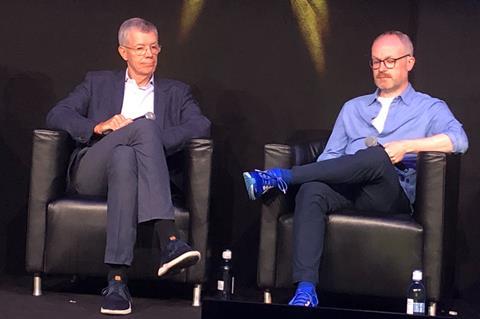
The need for collaboration between film distribution and exhibition is a perennial theme of the annual CineEurope trade convention in Barcelona, but it was the differing perspectives and priorities of the two sectors that spiced up the Executive Roundtable session on day one of this year’s edition (June 16-19).
Fernando Evole, VP EMEA at Mexico-headquartered global cinema operator Cinépolis, called for “more content, more diverse content, stronger windows and more marketing dollars” – in all four cases, putting the onus on film studios and distributors to supply these needs.
Andrew Cripps, head of theatrical distribution at Disney, offered a different perspective. “Fernando had a nice Christmas list,” he said. “But I think it’s important that every cinema visit has to be a good one. It has to be great service, premium formats. That’s all part of getting consumers out of their home today. So I think my Christmas list would be more investments [in cinemas]. We have to compete with all the other leisure options out there.”
Evole returned to the theme of windows when responding to the final question posed to all participants in the roundtable discussion: Is there anything that keeps you up at night?
“With windows, we need to make sure that we don’t make the mistakes that some territories have made,” he said. “I feel that the window in the US has broken the market, and if that happens in other territories, we will see a lot of value being destroyed.”
On that point, Cripps could agree.
“Shorter windows have confused audiences,” he said. “Disney has a very long window. We are committed to theatrical, and we are exclusively in theatres for longer than anybody else. But that’s Disney. I don’t think consumers can tell the difference between movies. And when some movies go out [to home entertainment platforms] in 17 days, and some are 60 days, we’re doing a very good job of confusing people.”
Also participating in the panel were Jane Hastings, CEO of EVT, which operates cinemas in Australia, New Zealand and Germany; Adon Quinn, CEO of Saudi Arabia’s Muvi Cinemas; and Hugh Spearing, EVP of global marketing and distribution at Studiocanal. The session was moderated by Sharon Reid, director of marketing and partnerships at the UK’s Cinema First.
Fit for purpose
Hastings emphasised the challenge of a release slate that in recent months has inadequately served all audience segments. “We’re fit for purpose in action adventure films and family,” she said. “We’re not yet fit for purpose in comedy, female-targeted films, drama and something for more mature audiences. But it’s better than it was, and the outlook is pretty good.”
Hastings also has concerns about how film marketing budgets are being spent. “We’ve tripled down on digital and we’re targeting the same customer,” she said. “What we need is mass awareness.
“I’ve always loved going to Hollywood, because I absolutely know what’s going on at the movies – I’ve never seen so many billboards. We’re all trying to say it’s a completely digital world, but it’s not just a digital world.”
Cripps quipped in reply: “I think you’ll find those billboards in Hollywood are for a different reason.”
He added, “Media costs never go down. They always go up. We spend more on marketing our big films now than we ever have before, and we’re finding it less effective. We all have to figure out different ways to tackle different audiences, niche audiences, and digital is a very effective way to do that. Films don’t support buying billboards in 100 countries around the world, given the media costs.”
On ticket pricing, Quinn revealed that Muvi had tried pulling the discount lever in Saudi Arabia, and discovered that short-term admissions gains were not sustained. Instead, Muvi is offering a significant discount on the customer’s next movie ticket purchase, after buying originally at full price – with the discounted offer expiring after a month. Solid results had been achieved.
Muvi faces challenges because Hollywood’s reliance on sequels doesn’t serve a country that has only had cinemas since 2018. “[Sequels] don’t translate to the Saudi market because the previous part of that IP was never watched in cinema,” explained Quinn. “How do we create that nostalgia factor [for audiences] when they never watched it in cinemas?”
Local content
Saudi Arabia is succeeding with local content – made in the home country or Egypt – and Quinn said six of the top 10 films at the 2024 Saudi box office were Arabic-language features.
Local content is a key part of Studiocanal’s strategy, and the company is trying to make more in each of the company’s release territories, said Spearing. “We know how important it is to fill the gaps and be complementary to the other lineup,” he added.
And although Paddington is the biggest franchise Studiocanal owns, original content is a key focus for the company.
“[Studiocanal UK production] We Live In Time really appealed to us, because we wanted to find something that could be for a female audience, and we also felt that it would be different to other movies in the marketplace,” said Spearing. “We’re always looking for those opportunities.”
Cripps was asked by moderator Reid if we might expect more original films from Disney, following the likes of The Amateur from 20th Century Studios and Searchlight Pictures’ A Real Pain.
“The top 15 titles last year [in North America] were all based on either existing IP or spinoffs of franchises,” replied Cripps. “So we have to recognise the market reality of what consumers are looking for.
“On the other hand, you can’t generate new franchises without launching original content.”
Cripps added that at the upcoming Disney slate presentation at CineEurope on Wednesday (June 18), “I think you’ll be surprised by the amount of original content that’s being generated.”
The 34th edition of CineEurope runs June 16-19 at the CCIB conference centre in Barcelona.

























No comments yet